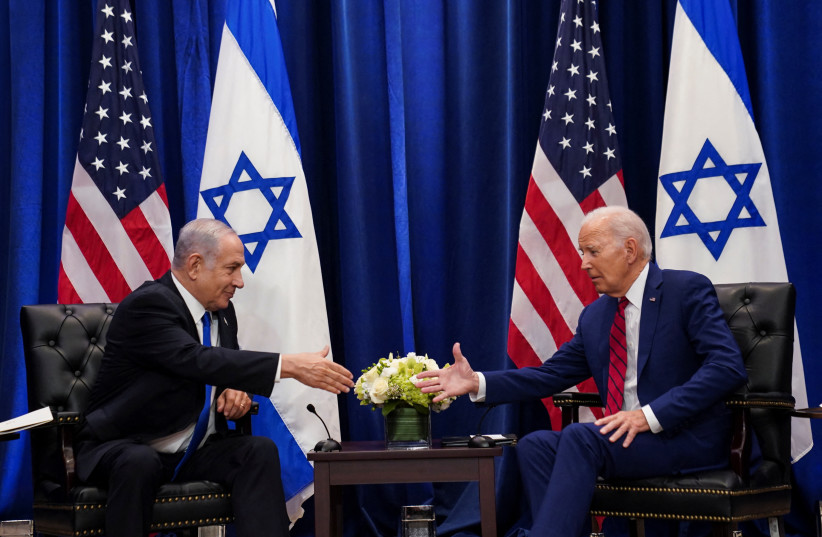The closest any US president has come to doing anything similar was Bill Clinton, who came to Israel in March 1996 as Israel was reeling from a spate of four suicide bombing attacks in nine days that killed over 60 people and wounded scores more.
Then, as now, Hamas was the terrorist organization behind those attacks.
During his visit, Clinton displayed unprecedented empathy and support for Israel, committing $100 million in military equipment and training to help Israel fight terrorism.
But besides demonstrating unwavering support for Israel, there was another dimension to the visit: the advancement of US interests.
Clinton’s trip on March 15 came just 14 days before the election in which then-prime minister Shimon Peres was running against Benjamin Netanyahu. Clinton used this visit to try to shore up support for Peres and convince Israelis to remain committed to the Oslo peace process, even though suicide bombers were targeting their children.

Ultimately, Clinton’s efforts failed on both counts. Netanyahu narrowly defeated Peres, and, as terrorists continued their attacks, most Israelis eventually soured on the Oslo process.
It is worth keeping that Clinton visit in mind – a visit motivated both by genuine support for Israel and by American interests, which Clinton defined as ensuring a Peres victory and a continuation of the Oslo process – when looking at Biden’s scheduled visit here on Wednesday.
Biden’s visit is undoubtedly a sincere demonstration of the president’s deep commitment, empathy, and support for Israel. This display of friendship and support is as important for Israelis to feel as it is for Israel’s enemies to see.
It is important for Israelis to feel, especially as voices are being raised worldwide and in much of the Western media – including the US media – slamming Israel for its military response to the Simchat Torah massacres. And it is crucial for Israel’s enemies to see that the US president has not wavered and continues to support Israel in this battle, despite those voices.
But the president’s visit here is not only about love for Israel. There are also American interests that a Biden visit at this time promotes.
Firstly, Washington’s short-term interest relates to how the Americans believe this war should be waged.
The US wants to see Israel allow humanitarian aid to reach Gazans. It also wants to prevent Israel from preemptively taking massive action against Hezbollah in Lebanon.
Senior US officials, including Secretary of State Antony Blinken and Defense Secretary Lloyd Austin, have reportedly relayed to Jerusalem the message that while the US understands fully the need for Israel to hit Hezbollah hard if they launch a missile attack and open a second front, what the Americans do not want to see is an Israeli preemptive action that could spark a wider regional war.
Positioning two aircraft carrier strike forces in the eastern Mediterranean within striking distance of Hezbollah’s missile launching sites aims to assure Israel that it need not take preemptive measures to neutralize those sites. It also signals that the US is ready to strike those launchers alongside Israel if Hezbollah dares to open up a second front.
As noted by IDF Spokesman Daniel Hagari, Biden’s visit holds “strategic importance.”
But it does not come without a price. And that price is the US expectation that Israel consider US concerns and interests when waging this war. Considering all the diplomatic support and concrete military aid that Washington is rendering, it will be difficult for Jerusalem to ignore those expectations.
Biden’s visit and unstinting support convey another critical message as well, and one that the US is eager to send to allies in the region and around the world: the US stands by its friends.
After years of the US signaling interest in withdrawing from the Middle East, following Biden’s withdrawal from Afghanistan in 2021 and with isolationist voices gaining traction in both the Republican and Democratic parties, the US military presence here sends a clear message that it won’t abandon its friends.
That is a critical message to send at a time when many in the region and around the world – foremost the Saudis and Taiwanese – are wondering to what degree they can rely on US support.
The dispatch of the aircraft carrier groups and moving some 4,000 marines to the area to join those strike groups is a reassuring signal to Israel and a move that has helped deter Hezbollah and Iran until now, but it is also reassuring to other US allies.
In the days leading up to the October 7 massacre, the news was dominated by talk – now silenced – of a possible US-Saudi-Israel pact that would include the normalization of ties between Israel and Saudi Arabia. One of the main motivations behind Saudi Arabia’s interest in the deal was to secure some kind of defense pact with the US.
The Saudis were traumatized by the Iranian-backed attacks on their oil facilities in 2019, an attack that knocked out 50 percent of its oil-producing capacity, and the failure of the US to come up with a muscular response and effectively address the situation.
Washington’s strong response to Hamas’s brutal surprise attack this time is meant to serve as a corrective: this is how the US stands by its friends. It is a message greatly appreciated by Israel in its time of pain, and one that is also meant to be seen and internalized by the rest of the world.
